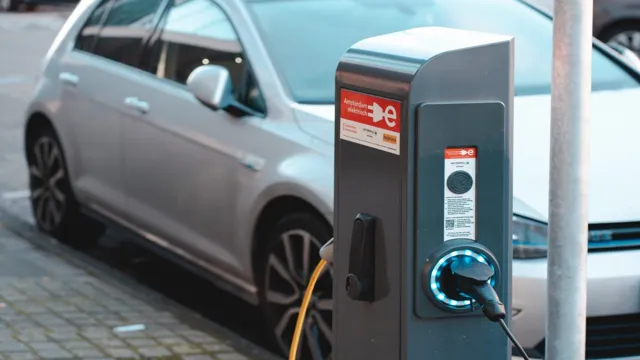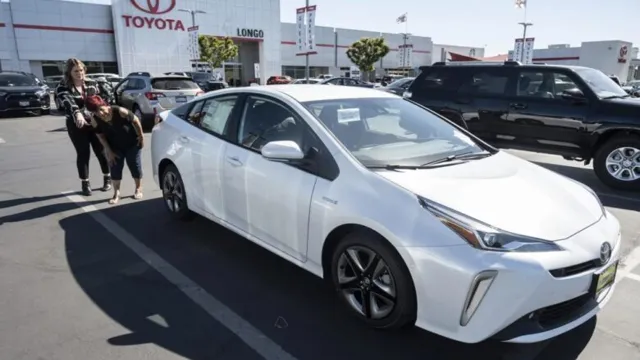Rev Up Your Savings: Unleashing the Tax Benefits of Owning an Electric Car
It’s no secret that the road to a cleaner and greener future is through electric cars. As the world transitions to a more sustainable model, many automakers are shifting towards producing more electric cars to meet the growing demand. However, did you know that besides contributing to the preservation of the environment, there are also financial benefits to buying an electric car? And that’s where tax benefits come into play.
Thanks to several government initiatives, when you purchase an electric car, you get to save on taxes! In this blog, we’ll dive into the tax benefits of owning an electric car, and help you understand how they can help save you money in the long run. So let’s get started!
Federal Tax Credits
If you’re considering purchasing an electric car, one of the main benefits is the potential for federal tax credits. These credits can significantly reduce the cost of your new vehicle and might even make it more affordable than a traditional gas-powered car. The federal government provides these tax credits as a way to encourage people to switch to more eco-friendly modes of transportation.
The amount of the credit varies based on a few factors, including the type of electric car you purchase and how much it costs. However, some of the most popular electric cars on the market right now are eligible for up to $7,500 in tax credits. Plus, if you purchase an electric car for business use, you may be able to take advantage of even more tax benefits.
Overall, buying an electric car is not only beneficial for the environment, but it can also be a savvy financial decision with the help of federal tax incentives.
Up to $7,500 in Tax Credits for Qualified Vehicles
If you’re considering purchasing an electric or plug-in hybrid vehicle, you may be eligible for a federal tax credit of up to $7,500. This tax credit is designed to incentivize the purchase of more environmentally-friendly vehicles and reduce carbon emissions. The amount of the credit varies depending on the vehicle’s battery capacity and other factors, but most eligible vehicles will qualify for at least some amount of credit.
To claim the credit, you’ll need to file IRS Form 8936 with your tax return. Keep in mind that this tax credit is not a refund, but rather a reduction in the amount of taxes you owe. So if you owe $7,500 in taxes and qualify for the full credit, your tax bill will be reduced to zero, but you won’t receive a check for the remaining amount.
Overall, if you’re in the market for a new car and want to make an eco-friendly choice, a qualified electric or plug-in hybrid vehicle could be a great option that also comes with some tax incentives.

Phase-out based on manufacturer sales
Federal tax credits are an excellent way to incentivize individuals and corporations to adopt eco-friendly practices, such as using electric cars. However, these credits are not meant to last forever. In fact, most tax credits have a phase-out period where the amount of the credit gradually decreases as more individuals or manufacturers adopt the specified practice.
In the context of electric cars, this means that Federal Tax Credits are being phased out based on the sales of electric car manufacturers. The starting amount for the credit is $7,500 per electric car and is reduced as the total number of electric cars sold by a particular manufacturer exceeds 200,000. For instance, once a manufacturer sells 200,000 electric cars, the credit is cut in half to $3,750 and is phased out over a year.
After that year, the tax credit is gone. Overall, the phase-out process encourages manufacturers to strive for more sustainable practices and helps to make electric cars more affordable for average consumers.
IRS.gov for more information
If you’re looking to take advantage of federal tax credits, then the IRS website is a great place to start. There are a variety of credits available to taxpayers, ranging from ones that reward certain environmentally-friendly behaviors to those designed to help offset the costs of education. The American Opportunity Credit, for instance, provides up to $2,500 per qualifying student to help pay for tuition and related expenses.
Meanwhile, the Earned Income Tax Credit (EITC) is available to working families with low or moderate incomes, providing a boost to their finances. The Child Tax Credit is another option, offering up to $2,000 per dependent child under the age of 1 Whether you’re a student, a homeowner looking to make energy-efficient upgrades, or a family trying to make ends meet, the IRS website is the go-to resource for learning more about the federal tax credits available to you.
State Tax Credits
If you’re considering purchasing an electric car, you’ll be pleased to know that there are some significant tax benefits to take advantage of. One of the most popular tax benefits is state tax credits. These credits can range anywhere from a few hundred to a few thousand dollars and vary depending on the state you live in.
For example, California offers up to $2,500 in tax credits for zero-emission vehicles, while Colorado offers up to $5,000 in tax credits for electric cars. Keep in mind that these tax credits have specific requirements that must be met before you can claim them. Typically, you’ll need to provide proof that you’ve purchased your electric car and that it meets state criteria.
Besides tax credits, you may also be eligible for other benefits such as reduced tolls, access to carpool lanes, and lower registration fees. Overall, if you’re considering buying an electric car, it’s worth researching the tax benefits in your state to help offset the cost of your new vehicle.
Varies by state
If you’re hoping to take advantage of state tax credits to reduce your overall tax burden, be prepared for a bit of research. The availability and specifics of state tax credits can vary greatly depending on where you live. Some states offer generous credits for certain types of businesses or industries, while others may not have any tax credits at all.
It’s important to do your homework and understand the requirements and limitations for any tax credits you’re considering. Don’t assume that just because a credit is available in one state, it will automatically apply in another. By taking the time to research your options, you can maximize your tax savings and potentially ease the financial burden of doing business in your state.
California offers up to $2,500
If you’re a homeowner in California, you may be able to take advantage of state tax credits to help offset the cost of installing renewable energy systems such as solar panels. The California Solar Initiative offers incentives of up to $2,500 for residential solar installations, while the Self-Generation Incentive Program provides rebates for qualifying battery storage systems or other forms of self-generation. These tax credits can help to significantly reduce the upfront costs of going solar or introducing other renewable energy sources to your home.
Plus, switching to renewable energy not only reduces your carbon footprint but can also provide long-term cost savings on your energy bills. So why not explore your options and see how you can take advantage of these valuable tax credits to invest in a more sustainable future for your home and community?
Colorado offers up to $5,000
If you’re looking to start a business in Colorado, you’ll be happy to know that the state offers up to $5,000 in tax credits. These credits are designed to encourage entrepreneurs to invest in Colorado and create jobs in the state. To be eligible, your business must meet certain criteria, such as being located in a designated enterprise zone or creating new jobs.
The amount of the credit depends on the type of investment and the number of new jobs created, but with up to $5,000 available, it’s certainly worth investigating. Colorado has long been a hub for small businesses and startups, and these tax credits are just one way the state supports entrepreneurs. So if you’re ready to take the plunge and start your own business, consider Colorado for its tax incentives and business-friendly environment.
Lower Operating Costs
When it comes to buying an electric car, there are a number of tax benefits to take into account. One of the biggest advantages is the lower operating costs. Electric cars are more efficient than traditional gasoline-powered vehicles, meaning they require less energy to run.
This translates to lower electricity bills and reduced maintenance costs, which can save you a significant amount of money in the long run. Additionally, many states offer tax credits and other incentives for purchasing an electric car, which can further lower your expenses. Plus, as electric cars become more popular, the cost of ownership is likely to decrease even further, making them an increasingly attractive option for environmentally-conscious drivers.
So if you’re looking for a car that’s both cost-effective and eco-friendly, investing in an electric car could be a great choice for you.
No gas costs
One of the biggest advantages of electric cars is the significantly lower operating costs compared to gas-powered vehicles. This is because EVs eliminate the need for gasoline, reducing or even eliminating fuel expenses altogether. Imagine never having to go to the gas station again, or worrying about rising gas prices affecting your monthly budget.
While charging an electric car does come with some costs, the price of electricity is generally much cheaper than gasoline, resulting in substantial savings over time. Moreover, electric cars require less maintenance and have fewer components that require regular servicing, leading to lower maintenance costs and greater reliability. All of these factors contribute to making EVs a more cost-effective choice in the long run, as well as a greener one.
So, if you’re looking for a vehicle that saves you money in the long run and reduces your carbon footprint, an electric car is definitely worth considering.
Lower maintenance costs
One of the key benefits of implementing advanced technology in any industry is the potential for lower operating costs. This is especially true in the case of machinery and equipment used in manufacturing and production. By utilizing advanced software and automation tools, businesses can significantly reduce their maintenance costs by streamlining operations and detecting issues before they become major problems.
This not only saves money on repairs and replacement parts, but it also reduces downtime and improves productivity. Additionally, some advanced technology solutions can even provide predictive maintenance capabilities, allowing businesses to stay ahead of maintenance issues and plan repairs proactively. Overall, the implementation of advanced technology in industrial settings can result in substantial savings, increased efficiency, and improved performance.
Final Thoughts
In conclusion, besides helping the environment, buying an electric car also has several tax benefits. One such benefit is the federal tax credit, which can range from $2,500 to $7,500 depending on the size of the car’s battery. Additionally, some states offer their own incentives for purchasing an electric car, ranging from tax credits to reduced registration fees.
These incentives vary by state, so it’s important to research what is available in your area. Lastly, electric cars also have lower maintenance costs and lower fuel costs, which can save you money in the long run. So not only are electric cars a great decision for the environment, but they can also benefit your wallet.
Conclusion
In summary, the tax benefits of buying an electric car can help you save on both upfront costs and long-term expenses. It’s like getting a green bonus for making an eco-friendly choice! So not only will you be helping the environment, but you’ll also reap the rewards in your wallet. Plus, who doesn’t want to join the ranks of the cool, futuristic electric car drivers? It’s a win-win all around!”
FAQs
What kind of tax benefits can I get from buying an electric car?
There are several tax benefits available for electric car owners, such as federal tax credits of up to $7,500 and various state and local incentives.
Are there any other benefits to owning an electric car besides tax incentives?
Yes, there are numerous benefits to owning an electric car, such as reduced fuel costs, lower maintenance expenses, and a reduced carbon footprint.
Do all electric cars qualify for tax incentives?
No, not all electric cars qualify for tax incentives. The eligibility for tax credits and incentives depends on the make, model, and battery size of the electric car.
Are the tax benefits for electric cars permanent?
No, the tax benefits for electric cars are subject to change and may not be available indefinitely. It’s important to check with relevant agencies and tax professionals to stay updated on the latest incentives and credits.




